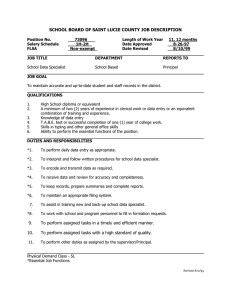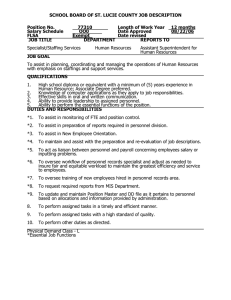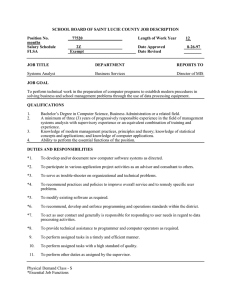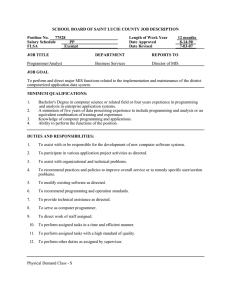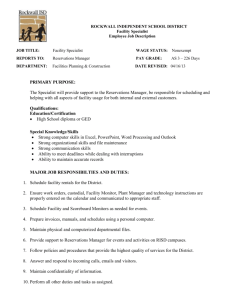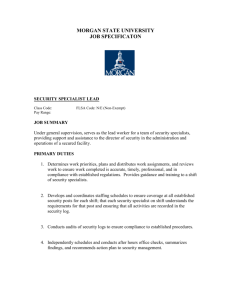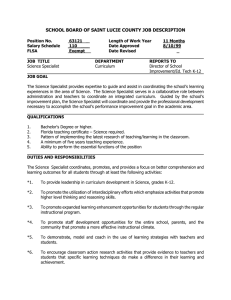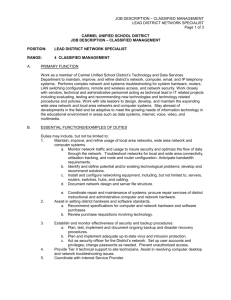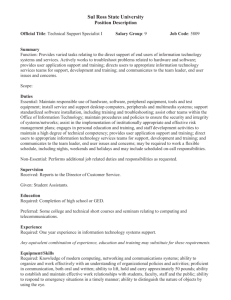CHABOT-LAS POSITAS COMMUNITY COLLEGE DISTRICT Class Specification NETWORK SYSTEMS SPECIALIST SERIES
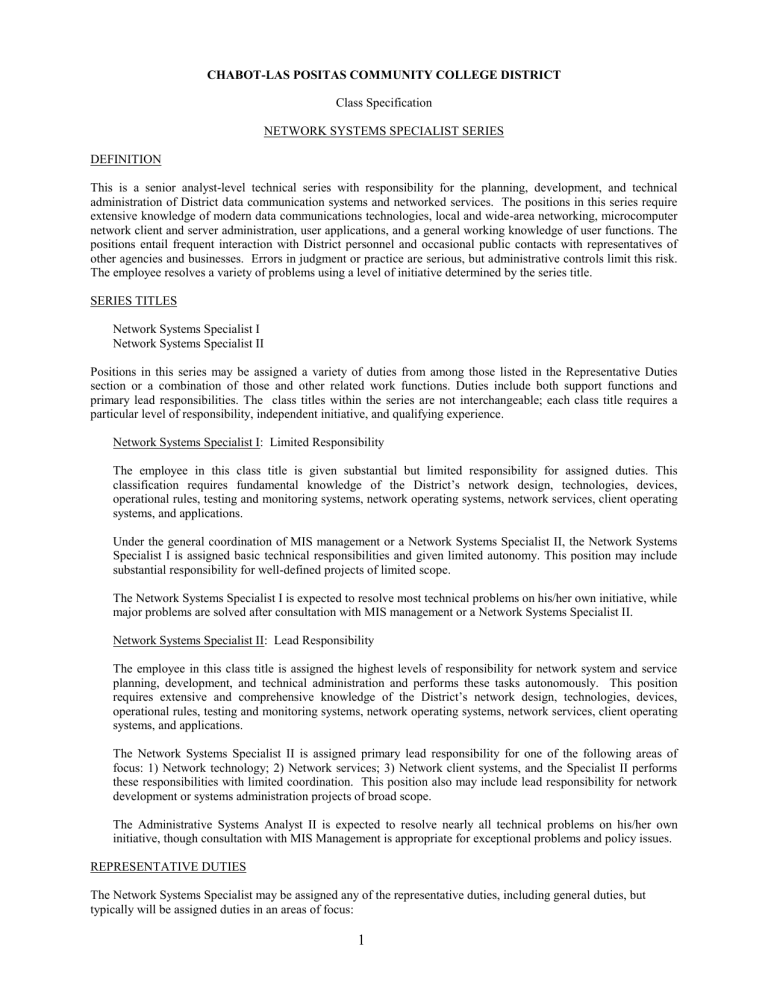
CHABOT-LAS POSITAS COMMUNITY COLLEGE DISTRICT
Class Specification
NETWORK SYSTEMS SPECIALIST SERIES
DEFINITION
This is a senior analyst-level technical series with responsibility for the planning, development, and technical administration of District data communication systems and networked services. The positions in this series require extensive knowledge of modern data communications technologies, local and wide-area networking, microcomputer network client and server administration, user applications, and a general working knowledge of user functions. The positions entail frequent interaction with District personnel and occasional public contacts with representatives of other agencies and businesses. Errors in judgment or practice are serious, but administrative controls limit this risk.
The employee resolves a variety of problems using a level of initiative determined by the series title.
SERIES TITLES
Network Systems Specialist I
Network Systems Specialist II
Positions in this series may be assigned a variety of duties from among those listed in the Representative Duties section or a combination of those and other related work functions. Duties include both support functions and primary lead responsibilities. The class titles within the series are not interchangeable; each class title requires a particular level of responsibility, independent initiative, and qualifying experience.
Network Systems Specialist I: Limited Responsibility
The employee in this class title is given substantial but limited responsibility for assigned duties. This classification requires fundamental knowledge of the District’s network design, technologies, devices, operational rules, testing and monitoring systems, network operating systems, network services, client operating systems, and applications.
Under the general coordination of MIS management or a Network Systems Specialist II, the Network Systems
Specialist I is assigned basic technical responsibilities and given limited autonomy. This position may include substantial responsibility for well-defined projects of limited scope.
The Network Systems Specialist I is expected to resolve most technical problems on his/her own initiative, while major problems are solved after consultation with MIS management or a Network Systems Specialist II.
Network Systems Specialist II: Lead Responsibility
The employee in this class title is assigned the highest levels of responsibility for network system and service planning, development, and technical administration and performs these tasks autonomously. This position requires extensive and comprehensive knowledge of the District’s network design, technologies, devices, operational rules, testing and monitoring systems, network operating systems, network services, client operating systems, and applications.
The Network Systems Specialist II is assigned primary lead responsibility for one of the following areas of focus: 1) Network technology; 2) Network services; 3) Network client systems, and the Specialist II performs these responsibilities with limited coordination. This position also may include lead responsibility for network development or systems administration projects of broad scope.
The Administrative Systems Analyst II is expected to resolve nearly all technical problems on his/her own initiative, though consultation with MIS Management is appropriate for exceptional problems and policy issues.
REPRESENTATIVE DUTIES
The Network Systems Specialist may be assigned any of the representative duties, including general duties, but typically will be assigned duties in an areas of focus:
1
Network Technology , including network system planning, development, security, and technical administration;
Network Services , including network server systems administration, network directory services administration, and server application administration;
Network Client Systems , including network client systems administration and client application administration.
The Network Systems Specialist, using standards, procedures, and guidelines that have been established by the
Management Information Services Department, may:
Network Technology Duties (limited or lead responsibility)
1.
oversee the District's data communications systems, including system planning, development, operational control, monitoring, and security;
2.
coordinate data communications network planning and implementation with District staff and architect;
3.
maintain network security; monitor security bulletins and announcements; research security issues; configure or update system software to enhance security; develop recommendations for operational procedures and security policies;
4.
perform or direct technical administration of the District's internet hosts and services;
5.
manage or direct the management of network devices such as switches, routers, hubs, repeaters, modems, terminal servers, print servers, and SNMP-compliant or RMON-compliant devices;
6.
develop and maintain documentation of the network cable plant and infrastructure for buildings, sites, and the entire District; develop and maintain documentation of network device configuration and operating rules;
7.
recommend District-wide technical standards for data communications network infrastructure and devices;
8.
implement and monitor network management software, communications software, analysis software, and instruments;
9.
manage maintenance contracts for network infrastructure devices.
Network Services Duties (limited or lead responsibility)
1.
oversee the District's administrative network servers, including system planning, development, operational control, monitoring, and security;
2.
perform or direct systems administration of the District’s network servers;
3.
implement and administer District-wide electronic mail systems;
4.
establish and document server operational procedures, including maintenance, back-up, and recovery;
5.
recommend District-wide standards for network server software, including operating systems, utilities, management software, and office automation applications;
6.
manage maintenance contracts for network servers and related software.
Network Client Systems Duties (limited or lead responsibility)
1.
oversee the District's administrative network client systems, including system planning, deployment, software distribution, operational control, monitoring, and security, and virus control;
2.
install or coordinate systems for distribution of microcomputer-based hardware and software to the network’s administrative clients;
3.
plan and implement procedures to help maintain software security and copyright compliance; monitor licensing of software installed on administrative networks; report copyright compliance violations to MIS management;
4.
recommend District-wide standards for networked client computers, printers, and other end-user devices;
5.
provide direct support for District-owned client PCs, including hardware and software installation, configuration, troubleshooting, and repair.
General Duties
1.
analyze District requirements for network systems technologies, capacity, and utilization and recommend specific strategies, plans, and designs to meet those requirements;
2.
plan and estimate required resources and timetables for systems project implementation;
3.
perform complex systems analysis tasks required to administer and maintain the District's data communications systems, servers, and clients, including problem definition, analysis, and solution planning;
4.
monitor computer network and server operational status parameters and performance;
5.
perform or direct technical administration of District network systems, services, and administrative servers;
6.
analyze and troubleshoot network system, server, and client problems and malfunctions; resolve technical problems or assist vendors’ representatives in the resolution of these problems;
2
7.
coordinate installation, maintenance, and repair of network equipment by outside vendors;
8.
recommend strategies to maintain the technical currency of network systems, services, and equipment;
9.
make budget recommendations to MIS management concerning communications systems, software, and equipment;
10.
prepare and distribute technical tips and advice to network users through memos, bulletins and newsletters;
11.
conduct orientations, training sessions, and workshops on operation of the District's networks and network services;
12.
provide regular liaison with College computing staff; coordinate systems and services as required;
13.
work with other Network Systems Specialists and consultants under contract to the District to coordinate network services and technical systems; perform backup duties as required;
14.
learn and use new technologies required to remain current in the field, and;
15.
perform other job-related duties as assigned.
MINIMUM QUALIFICATIONS
Knowledge of:
1.
principles of computer systems, network administration, and programming;
2.
principles and methods of TCP/IP network technology, design, security, and administration, including the
OSI model, domain name services, routing, sendmail, NFS, SMTP, UUCP, PPP, SLIP;
3.
Cisco router configuration and management in a multiprotocol environment;
4.
the Unix operating system and related communications services and technologies;
5.
principles and methods of Windows NT Server, Netware and Appleshare network technology, design, and administration;
6.
wide area networking technologies, including serial, dedicated digital services, switched digital services,
ISDN, T-1, T-3, Frame Relay, SMDS, ATM, SONET, etc;
7.
Internet services, including HTTP, telnet, FTP, the remote (r) commands, Gopher, WAIS;
8.
network protocols, including TCP/IP, IPX, SPX, SAP, Appletalk, and other WAN and LAN protocols;
9.
data communication technologies and standards, including both established standards such as IEEE 802.x,
RS232, and emerging standards such as EIA/TIA TSB-36, TSB-40, TSB-67;
10.
network cabling and hardware, including hubs, repeaters, switches, bridges, routers, network interface cards, modems, multiplexers, terminal servers, print servers, CSU/DSUs, Codecs, and RMON or SNMPcompliant devices.
11.
network transmission standards, including serial, Ethernet, FDDI, ATM, and emerging technologies;
12.
electronic mail exchange methods, messaging standards and protocols, including SMTP, POP, IMAP,
X.400, MHS, and others;
13.
microcomputer operating systems and shells such as MS DOS, Windows NT, Macintosh;
14.
network server software, including Novell Netware, Windows NT Server, Appleshare, NFS, and various peer-to-peer networks; related network server utilities;
15.
electronic mail software;
16.
office automation software;
17.
basic systems analysis and design concepts, and;
18.
information sources to remain current in the field.
Skills in:
1.
operating computers and related network equipment;
2.
data communication network design, planning, documentation, and technical administration;
3.
set-up and technical management of network cables and devices, including routers, switches, hubs, repeaters, network interface cards, terminal servers, print servers, CSU/DSUs, Codecs, and RMON or
SNMP-compliant devices;
4.
router configuration and management in a multi-protocol environment;
5.
selection, implementation, set-up and use of software for network administration, management, and monitoring;
6.
resolving technical malfunctions in network-related hardware and software;
7.
use of software for network administration, management, and monitoring;
8.
use of computer-assisted drawing software or other computer applications for network infrastructure documentation;
9.
analyzing technical data and problems, logical reasoning, problem solving;
10.
communicating clearly about complex issues, both orally and in writing;
11.
learning and applying new network technologies;
12.
planning for future network development;
13.
completing technical tasks without close supervision, and;
3
14.
establishing and maintaining effective working relationships with individuals and departments.
Education and Experience:
Network Systems Specialist I: Equivalent to completion of a Bachelors' degree in Computer Science or a related field and two or more years of experience in network or systems administration OR an equivalent combination of education and experience which indicates possession of knowledge and skills required.
Network Systems Specialist II: Equivalent to completion of a Bachelors' degree in Computer Science or a related field, AND two years practical experience as Network Systems Specialist I or Senior Programmer
Analyst I OR an equivalent combination of education and experience which indicates possession of knowledge and skills required.
License:
Possession of a valid class C (autos and light trucks) California driver's license.
PURPOSE OF CLASS:
To provide effective network systems and services design, implementation, and administration.
NOTE: This class specification is not necessarily all-inclusive in terms of work detail.
4
